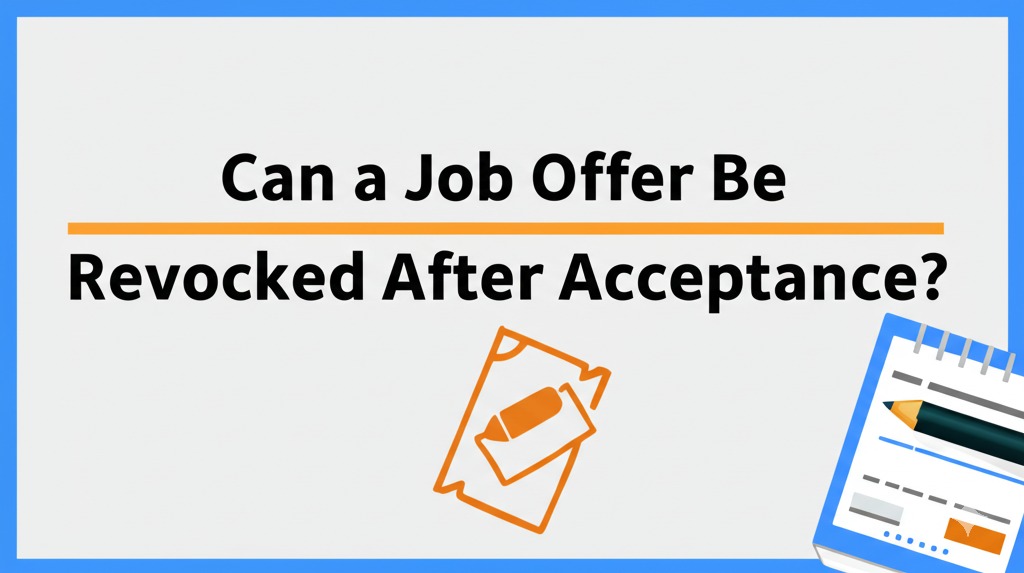
You’ve landed the job, signed the offer, and maybe even told your friends and family—so it’s a done deal, right? Not always. While accepting a job offer feels like crossing the finish line, it’s possible for employers to revoke a job offer even after you’ve accepted it.
Whether you’re a recent graduate or a seasoned professional, understanding your rights and the reasons behind a revoked job offer can save you from stress and confusion. In this article, we’ll break down everything you need to know about why a job offer might be rescinded—and what you can do if it happens to you.
Why Would an Employer Revoke a Job Offer?
There are a variety of reasons a job offer may be withdrawn after acceptance. Some are related to the candidate, while others stem from internal changes within the company.
1. Failed Background Check or Drug Test
If your offer is contingent on passing a background check or drug screening, and issues arise during that process, the employer may legally withdraw the offer.
2. Negative References
A glowing resume might be undone by poor references. If former employers or professional contacts share unfavorable feedback, the hiring company might reconsider.
3. Budget Cuts or Hiring Freezes
Sometimes, it’s not personal. Companies may implement a budget freeze, undergo restructuring, or even experience an economic downturn that forces them to pause or cancel hiring.
4. Internal Promotions or Reorganization
An employer might decide to fill the position internally, or eliminate the role altogether due to a sudden shift in priorities.
5. Misrepresentation on Resume
If the employer finds out you exaggerated qualifications or provided false information, that could be grounds for revoking the offer.
Is It Legal to Revoke a Job Offer After Acceptance?
The short answer: Yes, but with some caveats.
In most U.S. states, employment is “at-will,” which means both the employer and the employee can end the relationship at any time, with or without cause.
⚖️ What the Law Says
- Before your start date, you typically haven’t entered into a binding employment agreement (unless a contract says otherwise).
- Contingent offers are conditional and can be rescinded if those conditions aren’t met.
- Discrimination laws still apply. A job offer cannot be revoked for reasons related to race, gender, age, religion, or disability, as protected under the Equal Employment Opportunity Commission (EEOC).
Employment Contracts vs. Offer Letters
There’s a difference between a formal employment contract and a standard offer letter:
- Offer letters usually include language that reiterates at-will employment.
- Contracts may offer legal protection against arbitrary revocation if breached.
What to Do If Your Job Offer Is Revoked
Getting a job offer pulled back is stressful—but how you respond can make a big difference in how quickly you bounce back.
1. Ask for Clarification
Don’t panic. Ask the employer why the offer was revoked, especially if it came without warning. Understanding the reasoning can help you determine your next steps.
2. Review the Offer Letter
Check for any contingency clauses, or legal terms that might support your case. If you believe the revocation was unjust, you may want to consult an employment attorney.
3. Negotiate, If Appropriate
In some cases, particularly when the revocation was due to budget or internal changes, it might be worth asking if other roles are available or if the decision can be reconsidered.
4. Keep the Door Open
Leave on a professional note. You never know when a new opportunity may arise at the same company down the line.
5. Restart the Job Search
Update your resume, re-engage your network, and start applying again. Consider letting trusted contacts know you’re back on the market.
How to Protect Yourself from a Revoked Job Offer
While not always avoidable, there are steps you can take to reduce the risk of a job offer being rescinded:
- ✅ Ask for a written offer that clearly outlines terms and conditions.
- ✅ Inquire about contingencies, like background checks or drug screenings.
- ✅ Delay giving notice to your current employer until you’ve confirmed all pre-employment requirements are cleared.
- ✅ Maintain professionalism throughout the hiring process and avoid misrepresenting your skills or experience.
Conclusion: Stay Informed, Stay Prepared
So, can a job offer be revoked after acceptance? Yes—but knowing why it happens and how to respond puts you in a position of strength.
While no one wants to go through the disappointment of losing a job before even starting, it’s essential to understand your rights and take proactive steps to protect yourself.
If you’ve recently experienced this or are currently navigating the hiring process, knowledge is your best tool. Stay professional, stay flexible, and don’t hesitate to seek legal guidance if necessary.

Andre Cuevas provides career insights, job search strategies, and professional advice to help individuals navigate the job market and achieve their career goals.





